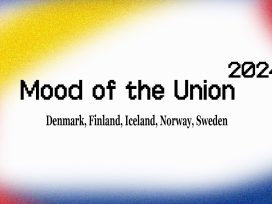It was not until the 1980s that the Holocaust experience was integrated as a universal issue into the various national projects constituting Europe. Sweden and Switzerland, both neutral during the War, are two prime examples of how, for a long time, issues of complicity and collaboration were avoided. The Nazi Gold controversy of the late 1990s shattered the established national perspectives of both countries. In its wider application, the controversy was instructive: in order to build real universality into the European project, cross-border provocation is a crucial element.
At the end of the War, Sweden and Switzerland were accused of using their neutrality for enrichment and not, as they had maintained, as a way of participating in the epochal struggle for the future of the human race. Switzerland faced the particular charge of unconditionally accepting to keep looted gold from Germany in its banks.
The post-war response of these two countries was to define their own national projects as unique attempts to achieve universal values. Their separateness from Europe in general was, they maintained, a means of upholding the common good. While supposedly embracing the liberal universe at the national level, they chose different roads. Switzerland, by remaining the centre of financial transactions, presented itself as the guardian of the free market of the world, as it pretended to have been against all odds during the War. Claiming special entitlement to another universal value, national sovereignty, Switzerland refused to enter the emerging structure of transnational bodies such as the United Nations. Its separateness, it appeared, gave Switzerland a special role as the central venue for international deliberations. Sweden took the opposite road to universality: its foreign policy objectives were symbolically channelled through the UN and other new international structures.
In the post-war negotiations between the Allies and the Swiss government on the handling of German assets and looted gold, Swiss politicians at home defined the issue as a case of David versus Goliath. A strong body of opinion saw the struggle as a vain attempt to uphold the sanctity of private property against infringements by the Great Powers. In November 1946, the chief Swiss negotiator, Walter Stucki, accused the Allies of having violated the principles embodied in their own Atlantic Charter. The fact that, in March 1945, Switzerland had bowed to American pressure and agreed to freeze all German assets, prohibit dealing in foreign currencies, and restrict the purchase of gold from Germany, was, he stated, the result of pressure worse than anything Göring had ever attempted, a violation of principles in a world “lacking material and moral foundations”, where Switzerland found itself in “dangerous political isolation”. The irony of a singularly narrow-minded definition of Swiss national interest proclaiming itself to be the embodiment of universal norms only became apparent to the world five decades later, when the World Jewish Congress and the Eizenstat report confronted the Swiss authorities on the matter of wartime Jewish property.
As for Sweden, after the War it had been easier to prod officials there into admitting an element of guilt in the commerce with the Third Reich. Dean Acheson reflected on the matter in his memoirs: “If the Swedes were stubborn, the Swiss were the cube of stubbornness.” Facing the Nazi Gold question, Swedish officials tried to avoid confrontation. With Prime Minister Göran Persson’s inauguration of a massive education project on the Holocaust at the end of the 1990s, Sweden, in the eyes of the world, was now dealing openly and conscientiously with the moral issues.
This seemingly open-minded position was very much in line with tradition. After the War, Sweden chose compassion as its own special quality, based on a recently established redefinition of the national project. A form of social change had been instituted in the 1930s that could now be proclaimed as the incarnation of modernity.
The moral basis was enhanced by the Allied victory over fascism. When social democrats like Bruno Kreisky and Willy Brandt returned from Sweden to their native countries after the War, they took with them a blueprint for the European society of the future: the welfare state, the all-inclusive definition of citizenship. The ideology of participatory democracy as the true legitimation of modern nation-states became firmly embedded in most western European countries. Sweden was thought to point the way out of a cumbersome historical tradition.
Sweden could afford to base her position vis-a-vis Europe on moral considerations. Compassion was directed principally at Third World countries. At the beginning of the 1960s, European integration was defined by a prominent young intellectual and author, Lars Gustafsson, as the transcendence of nationalism: “This awakening of international conscience, I believe, represents a way out (of), and perpetual consolation for, what we experienced for so long as isolation. If Swedish patriotism exists nowadays, it consists of our desire to make ourselves heard in the context of this new solidarity.”
The idea of being the most emancipated country in the world was integral to the “Swedish model”. It was traditional nationalism turned upside down. The psychological impact was exactly the same as in the old-fashioned version: Swedish elites could be very proud of their eminence in being non-nationalists. They became used to feeling morally superior due to the fact that they were no longer fettered by tradition. Leaving nationalism behind was the core of their achievement.
In hindsight, this use of anti-nationalism as a national paradigm must be one of the strangest social paradoxes in political history. Politicians and diplomats were convinced that they had a privileged insight into the future of humanity. They projected the Swedish attitude onto the world stage as a special sort of idealism. Sometimes, as in the case of support for the anti-apartheid struggle in South Africa (including material support for the ANC when it was branded as a communist front organization) and the strong moral stand on the Vietnam War, this self-confidence achieved something worthwhile. But there were other areas where the Swedish model turned into arrogance and negligence. The official attitude towards the Baltic countries – regarding them as non-existent – is a prime case in point (Sweden was the first western country to accept Soviet annexation in 1940). Reluctance to press the Soviet Union into admitting it had arrested Raoul Wallenberg is another. Generally speaking, closer to home, Swedish idealism tended to cede to Realpolitik. It is now common knowledge that the idealist consensus has eroded.
The historian Friedrich Meinecke interpreted German history as the victory of Nationalstaat over Weltbürgertum. In his view, every state was a law unto itself. Striving to embody the ideals of universalism, as Sweden and Switzerland claimed to be doing after the War, could be seen as the exact opposite of the German tradition of historicism. But the nationally defined ideology of progressivism was still based on an assumption of uniqueness. Historians in both countries, pretending to demystify the course of events, were able to use an established concept of nationhood as their screen in choosing and evaluating facts. They could stress apparently progressive elements, and disregard the rest.
But there are some interesting differences between the two countries in how the hidden elements were treated at the public level.
Switzerland’s two most prominent post-war author-playwrights, Friedrich Dürrenmatt and Max Frisch, continually used their talents to describe a counter-universe, an alternative to the hypocrisy masquerading as objectivity. Frisch’s comedy Biografie (Biography, 1967) is a satire on the concept of history as a project; a man is given the option of returning to the crucial points of his life and altering the decisions he made at the time. The constant revisions that ensue on the surface, as the result of rational decisions, turn into absurdities that make him realize that whatever pre-planned course he takes it is the wrong one.
His play Biedermann und die Brandstifter (Biedermann and the arsonists, 1958) is a tragicomedy on doing business with the devil. A man lets three arsonists enter his house; he accepts them as residents, with petrol cans, fuse and all. When they need matches, he duly obliges.
Frisch’s most famous play, Andorra (1961), based on an idea which had already appeared in his breakthrough literary work, Tagebuch mit Marion (Diary with Marion, 1947), is a tragic and terrifying depiction of the mechanisms involved in social inclusion and exclusion, where the ritual of omitting someone involves a kind of bonding for those remaining. Out of sheer pettiness, a man begins describing his stepson as a Jew; the boy, facing prejudice, comes to accept his given identity as an unalterable fact. When the country is invaded by a racially defined neighbouring state, his fate is sealed.
Frisch created a storm with an article titled “Unbewältigte schweizerische Vergangenheit” (Unreflected Swiss history), published in the weekly Weltwoche in March 1966, where he accused the younger generation of authors of neglecting to deal with the twelve years of Hitler’s rule and brought the contemporary treatment of refugees into the discussion. He touched a national nerve. Later that year, a solid analysis of the moral dilemma appeared in Alice Meyer’s Anpassung oder Widerstand. Die Schweiz zur Zeit des deutschen Nationalsozialismus (Conformity or resistance. Switzerland at the time of German National Socialism). A year later, a well-documented pamphlet that rapidly achieved classic status was published: Alfred A. Häsler’s Das Boot ist Voll. Die Schweiz und die Flüchtlinge 1933-45 (The boat is full. Switzerland and the refugees, 1967). Swiss collaboration was carefully examined in Walter Wolf’s Faschismus in der Schweiz (Fascism in Switzerland, 1969). And a major, four-part history of Swiss neutrality, Edgar Bonjour’s Geschichte der schweizerischen Neutralität (The history of Swiss neutrality), was published between 1965 and 1970. It gives a wealth of information about the choices made.
The issue of the institution of a “J” in the passports of German Jews was raised in Switzerland immediately after the War and re-emerged as a newspaper polemic in the mid-1950s, forcing the Swiss Bundesrat to start an official investigation that was published in 1957. The report leaves no doubt about the shared responsibility of Swiss politicians and officials in persuading the Germans to add the “J”. Seven decades later, the role of the Swedish government in this process remains to be investigated. The issue appeared briefly in the Swedish discussion in the 1990s and then disappeared. Although it is not known to what extent Sweden was involved in the “J” matter, there are strong indications that the change was actively supported in Stockholm.
Half a dozen books have been published in recent decades that deal with the Jewish part of Swiss history. All discuss anti-Semitism and refugee policy in a very forthright manner. In Sweden, nothing comparable was published until the 1990s. Moreover, the critical positions taken by authors and journalists in Switzerland have affected the country’s political climate. The rehabilitation of Paul Grüninger is a case in point. A police chief in the border areas fronting on Austria and Germany, Grüninger was dismissed in 1940, accused of using false information to let Jewish refugees into the country. He was rumoured to have made money from the operation and died semi-destitute at the end of the 1960s.
A Swiss journalist, Stefan Keller, made a meticulous study of what occurred; he forced the authorities to produce the minutes of the trial and the reports of the secret police. A cautious estimate is that Grüninger saved 3 000 Jews from the Holocaust. There is no evidence that he did so for personal gain. His breach of the service regulations involved stamping a date of entry in the refugees’ passports that preceded the date on which Switzerland closed its borders altogether.
Public opinion forced a reluctant Swiss government to reopen the case, and the court referred in its verdict to an ancient Swiss practice – the right to act in self-defence. Posthumously, Grüninger was fully exonerated. Years after his death, he has become the hero of wartime Switzerland. And the documentation surrounding his fate has released the stink of Realpolitik at that time – a power game laced with accommodation and discreet anti-Semitism.
The arrogant attitude held by the Swiss political and financial establishment seems to have polarized opinion and ignited a continued discussion. In late 1960s, a small stream of independent investigation was set in motion that turned into a flood in the late-1980s and early-1990s. This latter wave included historical research of great significance, such as Pierre Th. Braunschweig’s Geheimer Draht nach Berlin (Secret wire to Berlin, 1989). Virtually everything that fed the frenzy about the gold transactions was described by the journalist Werner Rings in his book Raubgold aus Deutschland (Looted gold from Germany, 1985). Rings also published a popular history of the war period that dealt explicitly with the controversial issues of refugee policy, anti-Semitism and collaboration. Both Rings and Trepp also looked at Sweden’s role. They share a basic understanding of what it was all about: invisible, multinational networks of influential people for whom trading with the Third Reich was, at least for a while, business as usual.
In Sweden, a general consensus lasting from a year or two after the War until the late 1980s limited the terms of national discussion on war issues. Unlike in Switzerland, the number of major literary works dealing with Swedish morality during the War is very limited. Fiction dealing with the Holocaust experience was almost entirely written by Swedes with Jewish background – Peter Weiss is the most significant example. The same general silence holds true of historical research. It took a 1989 pamphlet by journalist Maria-Pia Boëthius, recently republished, to start a process of revision of the established positions. Boëthius strongly attacked the prevailing view among Swedish historians and was immediately called over-zealous. In the 1990s, however, an interpretation of Swedish neutrality more in line with Boëthius’ position has been emerging among historians.
A significant sign of this change is that Professor emeritus Stig Ekman, who led a massive research project into Sweden’s war history in the 1970s, has openly regretted the lack of moral perspective in the definition of subjects: “Ultimately, indignation about Sweden’s accommodation of Germany must be seen in the light of the fact of Swedish collaboration with the regime responsible for the Holocaust”. Some of his younger colleagues have done research in line with this reappraisal. Some fifty years after the Holocaust ended, young historians started to deal with aspects of the Holocaust that affected Sweden.
The fact that for decades Swedish historians neglected totally the study of Holocaust issues is now itself the subject of analysis. This is an extraordinary case of insularity in a period when the Holocaust has been established internationally as a major field of contemporary history for at least three decades.
The first book dealing with Sweden in the relation to the Holocaust was written by an American historian, Steven Koblik, and published in 1987. A student of Koblik’s, Paul Levine, moved to Sweden in the 1990s in order to finish his PhD dissertation. Levine has added important knowledge to the appraisal of Swedish refugee policy by describing the moral stand in relation to Jews taken by a few Foreign Office officials, and has put the singularities of Swedish historical research into perspective by pointing to a “mentality of neutrality”. In Levine’s view, the long-time lack of interest from Swedish historians in the Holocaust is a result of the dominance of this attitude. The established notion has been that any concession made by Sweden during the War was morally defensible, since it kept the nation at peace. In contrast, Levine points to the issue raised by the Nazi Gold controversy: that Swedish trade with Germany, at least from 1943 onwards, helped to prolong the War. From this perspective, the wartime Swedish coalition government can be accused of indirectly adding to the impact of the Holocaust.
The long lasting avoidance of moral issues related to the War illustrates a particular aspect of Swedish political culture during the welfare period: consensus as the prime objective of the political class, regardless of party. It was strongly linked to the ideology of Sweden’s unique universalism.
The psychology of distance is also a major element in Swedish attitudes to the European Union. Formally, Sweden is a member state. But the fact that the Union project was initiated as a peace building effort, and that it has been remarkably successful in blocking military conflict between major European states, is rarely touched on in Sweden. The lack of an in-depth discussion of the war experience as a founding element in the European project – including the fact that the racist dimension made the War utterly different from earlier conflicts in Europe – illustrates how particularities of national histories, unless confronted by alternative interpretations, will affect political attitudes long after the historical events. Attitudes shaped by Swedish and Swiss neutrality during the War are still part of the collective sub-consciousness.
The Nazi Gold issue rocked the boat in both countries and became a worldwide media controversy. It was effective because confrontation came from the outside: politicians in Sweden and Switzerland were forced to face the issues.
I will give two more examples of cross-border interaction on moral issues related to universal rights of citizens. They are both cases of a structurally based collective silence. In 1997, the newspaper of which I was then editor-in-chief, Dagens Nyheter, made an investigation into a matter that had, until then, attracted very little public attention: the forced sterilization of some 60 000 Swedes – most of them poverty-stricken women – between the 1930s and the mid-1970s. There existed an academic dissertation dealing with the theme that had conveniently gone unnoticed.
After we first ran the story – researched and written by Polish-born journalist Maciej Zaremba – it took a week for it to become general news in Sweden. Other media stayed silent during the first few days. In the meantime, Sweden was invaded by journalists from all over the world, including celebrated American television anchors. A later report by the Swedish foreign office stated that the international coverage of this story constituted two thirds of everything written about Sweden that year.
The Swedish minister in charge of the issue was confronted with the question of compensating the victims on a CNN news programme. Swedish media, including my paper, had until then neglected this particular question; now the minister had to apologize facing an international audience.
A similar case of media blindness in relation to modern history occurred in Norway.
Besides all its other dimensions, the extermination of the Jews was robbery on the grandest scale in history, with a network of fences and profiteers extending across a continent. The moral conundrums posed by the extermination project affected occupied countries as well. Homes, businesses and valuables owned by Jews changed hands during the War. A number of governments discouraged survivors from confronting the new owners. In eastern Europe, communism gave state authorities the option of treating Nazi confiscation of Jewish assets as an instituted element in the abandonment of private property.
The Norwegian case shows that guilt cannot easily be fitted into categories of obedience, neutrality and resistance. Slightly over one third of the 2 100 Norwegian Jews were killed in 1942 within three months of their assets being seized. Thanks to the very long border with Sweden, most of it passing through uninhabited terrain, a majority of the remaining Jews managed to escape.
Those who survived the Holocaust returned to find others living in their flats and houses. Their bank accounts had been cleaned out, their life insurance policies had been cancelled and their personal possessions scattered. The special office created by the Norwegians in 1942 to handle the assets of Norwegian Jews, “The Liquidation Board for Confiscated Jewish Property”, did not cease to exist after the liberation. Instead, it was renamed the “Reparations Office” and some of its former staff were used as experts in defining the terms of compensation. The only officials sentenced for treason were those who had been members of Quisling’s party. Thus, Jews trying to reclaim their assets in some cases faced officials who, three years earlier, had supervised the authorized theft of their property.
In the mid-1990s, a young historian, Bjarte Bruland, and a journalist, Björn Westlie, exposed the wound that had been festering ever since the end of the War – who were those involved in handling the assets that the Quisling regime confiscated from Norwegian Jews? Such property, it turns out, was much sought-after and was sold at auctions and at special property markets; the customers were normal Norwegians who acted in full knowledge of the items’ origin. Those who had good contacts within the government agency managing the property could get special deals.
The orderly lists of stolen Jewish property, meticulously registered and evaluated, were easily accessible in Oslo’s National Archive. But, until they were found by Westlie, no one had bothered to look through them. Westlie’s disclosures were published on the fiftieth anniversary of the liberation, whereupon the World Jewish Congress asked him to write a report in English. International news agencies picked up the story when Westlie’s report appeared in New York. Suddenly, the affair became front-page news in Norway. It had taken eight months and cross-border attention for the matter to become a national scandal and it stayed a dominant political issue for months to come. The government was forced to set up a commission of enquiry that ended in an all-party agreement on a policy of economic compensation to Norway’s Jewish community.
The controversy that erupted in Norway illustrates a wider problem. Post-war nationhood in most occupied countries was built on myths of general resistance. After more than half a century, Norway was forced to confront the fact that its definition of wartime resistance largely excluded the Jews and that this exclusion continued in subtle ways even after the War. In France, where the complicity of the Vichy government had much wider ramifications, the conflict between a heroic mythology and the actual facts is even more evident. It took the effort of an American, Robert Paxton, to force French historians to start dealing with the issues.
In my opinion, a meaningful citizenship in Europe must include the right and duty of everyone, regardless of nationality and background, to treat rights issues on a transnational basis. Provocation across borders is necessary to build an element of real universality into the European project. Lord Acton once tried to define the issue in relation to a specific mindset: “Our Waterloo must be one that satisfies French and English, Germans and Dutch alike.” The comment by Swiss author Adolf Muschg in relation to the Nazi gold controversy catches the core of the matter: “It was long ago: now we are paying for the sleepless nights that we didn’t have because of Auschwitz; now we are overtaken by all the concerns which never affected us in relation to the building of Europe, drowsing in the sleep of the self-righteous, a state of mind where tears turned dry.”






